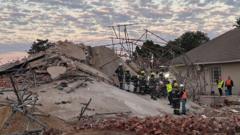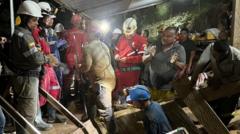Volunteers and rescue teams faced harrowing conditions in a Stilfontein mine, where reports surfaced of illegal miners resorting to cannibalism for survival. The operation shed light on the dire consequences of illegal mining amid government crackdowns and growing community outrage regarding the loss of life.
Desperate Plight of Illegal Miners Exposed in South Africa

Desperate Plight of Illegal Miners Exposed in South Africa
A rescue mission in a disused South African mine reveals grim realities for miners trapped underground, including starvation and tragic losses.
Trapped underground in a disused South African mine, miners encountered a haunting reality of survival that has triggered widespread outrage and scrutiny. As rescue efforts unfolded in Stilfontein, it became evident that some miners resorted to extreme measures, including allegations of cannibalism, to endure their harrowing circumstances.
Mzwandile Mkwayi, a 36-year-old volunteer who recently spent time in the mine, described the overwhelming stench as he descended into the darkness. The former convict, known locally as Shasha, shared that when speaking to fellow miners, he learned of their desperation: “Some had to eat other [people] inside the mine because there was no way they could find food.”
The miners had been stuck underground for months following a police operation aimed at curbing illicit mining. The abandoned mines, once a lifeline for many, have turned into death traps, with over 70 bodies discovered at the site and physicians reporting severe cases of dehydration and starvation among the living.
Mkwayi's accounts of the situation echoed those of other rescued miners, who detailed the misery of their peers and the painful toll of starvation during legal proceedings initiated following the rescue. "From September through October 2024, the absence of even basic sustenance was absolute,” one miner recalled, painting a grim picture of desperation.
Local community efforts prioritized rescue attempts, leading individuals like Mkwayi to volunteer for the perilous task of descent into the 2km (1.2 mile) deep shaft. "It was a painful thing to see," Mkwayi noted, as he described bodies scattered throughout the mine, revealing the human cost of illegal mining operations.
Despite the government launching Operation Vala Umgodi, aimed at dismantling illegal mining activities, critics decried the consequences of halting food and water supplies to the miners. Activist Magnificent Mndebele firmly stated, "We hold the view that the government has blood on its hands," particularly accusing authorities of failing to act adequately.
The tragic death toll of 87 has ignited furious protests and condemnation from grieving families and activists who claim that the state is culpable for the miners' deaths through negligence. "This help has come too late,” Mndebele lamented, pushing for accountability and highlighting the need for alternative livelihoods for communities grappling with poverty.
As the aftermath of this incident continues to unfold, calls for the regulation of small-scale mining have grown louder. Mkwayi emphasized the plight of the miners, stating, “If your children are hungry, you won't think twice about going down there.” The intersection of desperation, economic hardship, and government inaction continues to shape the ongoing narrative of illegal mining in South Africa, underscoring the need for urgent solutions and humane policies.




















